Bash Doran's adaptation of Kate Atkinson's novel 'Life After Life' comes to ±«Óãtv Two and ±«Óãtv iPlayer from Tuesday 19th April.
Life After Life tells the story of Ursula Todd, who is born to Sylvie and Hugh (Sian Clifford and James McArdle) one night in 1910, but dies before she draws her first breath.
On that same night in 1910, Ursula is reborn and survives. Time and time again, living and dying in different circumstances, Ursula is reborn into a new, alternative iteration of life once more.
This compelling story follows Ursula as she navigates each new life, through a critical era which spans two world wars, an encounter with Hitler and major life events. But what is it that Ursula so desperately needs to stay alive for?
Can a perfect life ever be lived? Can the course of history ever be changed?
What if we could live life again and again?
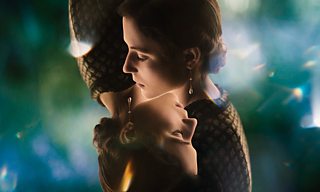
Life After Life (Credit: ±«Óãtv/House Productions/Sally Mais)
Bash Doran is the Screenwriter & Executive Producer of Life After Life
What is Life After Life about?
Life After Life is a phenomenal novel by that has a large collection of die-hard fans, that people have tried to adapt for the screen many times before. Usually they were trying to make it into a feature. [Executive Producer] had the idea to try to turn it into a television show, and that was the breakthrough form that will allow us to bring it to a larger audience.
"What if you could come back and do it all again…?" Ursula and her brother Teddy are in a bar in London discussing what they would do if they could live life again and again. What if?
Were you familiar with Kate Atkinson or Life After Life, before?
I was familiar with Kate Atkinson but I had not read, for whatever reason, Life After Life. I didn’t read it until Tessa brought me the novel, shoved it in front of me, and told me to immediately read it. Kate Atkinson writes incredible characters that have extraordinary layers and depth, and unlike some novelists she has an absolutely extraordinary gift for dialogue. Dialogue that reveals individuals in all of their idiosyncrasy. She was surprised by the first draft that she saw, because I had included so much of her dialogue. Obviously she was gratified, but she was surprised.
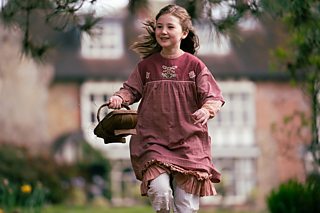
Ursula 4-5 (ELIZA RILEY)(Photo Credit: ±«Óãtv/House Productions/Nick Wall)
What was it about the novel that really connected with you and made you want to adapt it?
There were two things that I really found myself intrigued by, to the point that I couldn’t say no. The first was very personal - I had been told it was unadaptable by other people and that got me intrigued. I really love a structural puzzle. Also, I loved the book, and I couldn’t put it down, and I just thought, that if you can’t put this story down, this is a story that everybody’s going to want to watch.
I think I was told it wasn’t adaptable simply because people had tried and failed. To me, the real challenge lies in the fact the novel is doing something incredibly sophisticated. I mean, the idea of somebody being reborn or living their life over is something we’ve seen actually in various Hollywood movies. However, the character always knows that that's what is happening. In Life After Life there’s a real twist on that. The character is reborn, but she doesn’t actually know that she’s living her life again. That is a very sophisticated take, which is harder to dramatise because it means that the audience is ahead of the character, which is something that, in conventional film storytelling, you don’t do.
However, if you can find a way to bring the audience along with you it makes for an incredibly sophisticated piece of work. I mean, the really big challenge is that in other versions of this story, the central character knows that they’re sort of stuck in a loop and they’re trying to get out of it. Our central character, Ursula, doesn’t know this, so what you’re watching is her groping with this actually very relatable sense that I think most people have had, of ‘did this just happen? Have I been here before? Why does this all feel familiar?’
But it’s not a superhero movie where she’s just coming back to put something right - the novel lives in a more literary space than that. So it’s really become a question of how we can be true to this beloved novel.
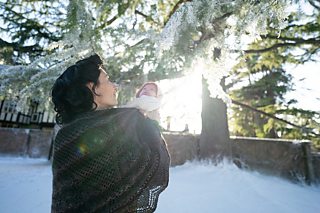
Sylvie (SIAN CLIFFORD)(Photo Credit: ±«Óãtv/House Productions/Nick Wall)
Who is Ursula? Where does she start and where does she end up?
In some sense, Ursula is sort of all of us, because we really get to know her as a baby. She’s initially born into this world as a blank slate and then for whatever reason has been selected to just constantly die. Each time she dies, she comes back with a greater and sharper set of instincts, as to how to evade death. She also starts to come back with a set of existential questions: why are we on this Earth? What are we supposed to do?
And then, what are we supposed to do with the fact that life can be so unbearably painful, and encapsulate so much tragedy, both on a sort of global scale - the novel deals in the reality of war - and then on an incredibly personal scale, from things that could happen to you as an individual?
Ursula is a woman, and experiences sexual violence, and all kinds of other things that are mostly specific to the experience of being a woman on this Earth. She also experiences all kinds of losses, and ends up as someone whose take on life is as this compromised experience, and yet at the same time feels able to embrace the adventure and the beauty and the joy of it.
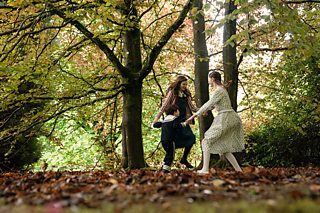
Teddy 4-6 (OSCAR ESKINAZI), Ursula 8-10 (ISLA JOHNSTON), Pamela 11-13 (SADIE BYRON)(Photo Credit: ±«Óãtv/House Productions/Nick Wall)
Did you feel you had to do a lot of heavy lifting to make it a dynamic, televisual piece?
In some ways adapting the novel was very simple, because I went in and I told the ±«Óãtv that I wanted to approach this novel the way people have approached adapting . This is one of the great British novels, and I’m not interested in doing my take on the novel, as this is Kate Atkinson’s Life After Life and we need to be true to that. Everybody fully agreed.
However, it wasn’t quite as simple - though I wish it was - as just taking the incredible scenes that Kate had built, putting them into a Final Draft document and there it is on the screen. Television is a different form. I did have to build out and create some new scenes and some new settings. But what I was always making sure I was doing, and too, because I worked with him on these scripts, ultimately, was making sure we were telling Kate’s story.
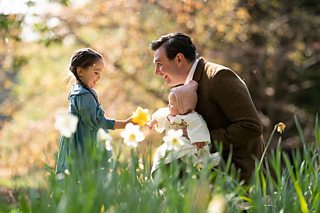
Pamela 3 (HOPE DELANY), Hugh (JAMES McARDLE) (Photo Credit: ±«Óãtv/House Productions/Nick Wall)
Were there conversations between yourself and Kate Atkinson at any point in the adaptation process, or did she leave you to it?
Kate and I interacted, in as much as we got along well. She was very complimentary and supportive about the first drafts, but I didn’t reach out to her as I continued with my work. It was an incredibly complex adaptation, which she fully acknowledged. It was an incredibly complex novel to write, you’re holding an enormous amount, you’re not just holding one life in your head, you know, you’re holding essentially hundreds, if you include the other characters. I didn’t think it was wise to try to loop too many people in to that process. What we did do was ask for feedback on each draft after they were written. And she was, I would imagine, a little bit restrained, because her notes were few, and incredibly helpful. All of them were taken.
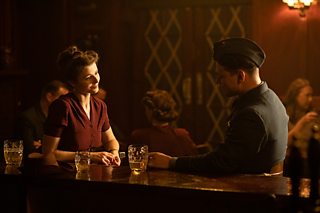
Ursula (THOMASIN MCKENZIE), Teddy (SEAN DELANEY) (Photo Credit: ±«Óãtv/House Productions/Sally Mais)
Why should audiences watch Life After Life?
Life After Life is about a young woman who’s lucky enough to be given the opportunity to live life again and again and again and again, until she figures out how to do it. What’s great about it is that learning how to do it is something we can all relate to. What she finds out is something that is so inspiring.
Watch Life After Life on ±«Óãtv Two and ±«Óãtv iPlayer from Tuesday 19th April at 9pm
